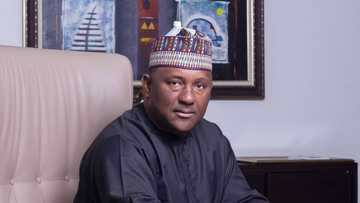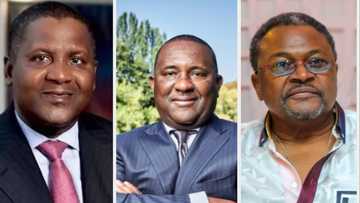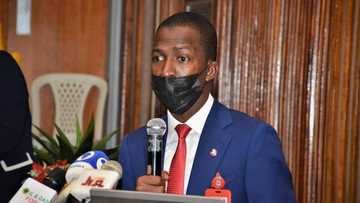Nigeria Has Only $60 Million Left in its Excess Crude Account One More Big Withdrawal Could Be Game Over
- It is almost game over for Nigeria and one big withdrawal from excess crude account could see it drop to unredeemable state
- According to reports Nigeria excess crude account has dropped significantly to just over $72 million
- Even with oil trading above the expected price, Nigeria cannot save its oil revenue for which the ECA is created
It has been revealed that Nigeria's Excess Crude Account (ECA) is now left with just $60 million million a massive decline from $2.1 billion it stood at 2015.
What this means is that the federal government in the last six years have had to deep its hands the ECA which is considered as oil savings and pull out over N2 billion.
In October 2021, a member of the House of Representatives, Honourable Farah Dagogo described the depletion as “mind-boggling”.

Read also
Rabiu, Nigeria's Second Richest Man, make N420bn in a Week, Closing the Gap on Dangote, Who Loses N80bn

Source: Twitter
Giving an update on the depletion of the reserves in October of 2021, spokesperson to Vice-President Yemi Osinbajo, Laolu Akande, was quoted as saying by Vanguard:
Do you have a groundbreaking story you would like us to publish? Please reach us through info@corp.legit.ng!
“Excess Crude Account (ECA) balance as at 13th October 2021 stands at $60, 857,773.43; Stabilisation Account, balance as at 13th October stands at N25,009,892,511.55; Development of Natural Resources Account balance as at 13th October 2021 stands at N56,144,024,000.71.”
History of Nigeria excess crude account
The Excess Crude Account (ECA) was established in 2004 as a natural resource development fund to serve as a sort of buffer during crises.
At the time it was established, ECA grew from $5.1 billion in 2005 to over $20 billion by 2008, accounting for more than one-third of Nigeria’s external reserves at the time, before dropping in 2009 to a paltry $2billion.
Ever since, ECA has hovered around $2 billion before closing in December of 2018 at $631 million.
The free fall has continued ever since. As at October 2019, ECA stood at $324 million. Few months later, as at March 2, ECA fell to $71.8 million.
The present level of $60 million shows ECA has dropped by 99.7 percent when compared to the level it was in 2009.
Hope of recovery
Any hope of adding to the remaining balance, if any might not be anytime soon despite oil having a very good run.
As at Wednesday, January 13, 2022 a barrel of oil is sold at $85 per barrel which should come as a good news and means more more foreign exchange to save.
But rather it is a big headache for the Nigerian government.
This is because Nigeria is not producing enough oil to sell and last year only average 1.54 million barrels per day when it has the capacity to do over 2 million barrels per day.

Read also
Rabiu is now the second-richest man in Nigeria details of how he unseat Mike Adenuga in 24 hours
This low production resulted to a 43.7% less oil revenue of N754.2 billion when the country had a target of N1.34bn.
This low revenue is despite oil price selling at $60 per barrel far above the budget benchmark of $42.
As that is not enough, there is oil subsidy payment since Nigeria import most of its products, the higher the internation price for oil the more expensive oil imported will be.
To help cover the cost, and keep pump price at N165 Nigerian government paid over 1.15 trillion in 11 months as subsidy.
All this means there is no money to save into the excess crude account and with production challenges not going anytime soon no there is definitely no hope in the nearest future.
Okowa to FG: Use percentage of fuel subsidy funds for poor Nigerians' health insurance
Meanwhile, Okowa had called on the federal government to use 25 per cent of funds expended on fuel subsidy to provide health insurance for vulnerable Nigerians.
A statement sent to Legit.ng by the Delta state government noted that Okowa made the call on Friday, March 19, when he received the minister of state for health, Dr. Olurunnimbe Mamora, who visited him at Government House, Asaba.
Okowa said that the federal government spent lots of money in subsidizing fuel for the rich, without consideration for the vulnerable in the society.
Source: Legit.ng




